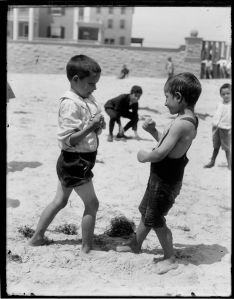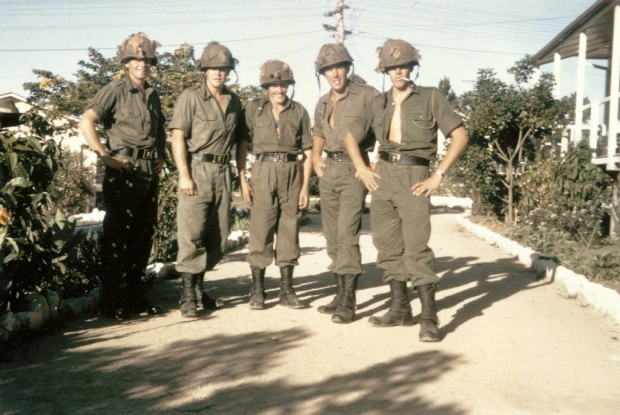“During the last six thousand years nations have hated one another, it is now time to stop. War must cease. Let us be united and love one another and await the result. We know the effects of war are bad. So let us try, as an experiment, peace, and if the results of peace are bad, then we can choose if it would be better to go back to the old state of war! Let us in any case make the experiment. If we see that unity brings Light we shall continue it. For six thousand years we have been walking on the left-hand path; let us walk on the right-hand path now. We have passed many centuries in darkness, let us advance towards the light.”
-‘Abdu’l-Baha

I’ve had a heavy occurrence of conversations about human behavior, and in particular, verbal and physical violence, from snide remarks to open war. As is often the case when I notice such patterns, the vast and weighty trail of atrocities that have occurred over time made me think about their source. Reflection on the topic of human atrocity and its connection to “cycles of violence” has made it a natural and obvious next post. Friends and collaborators have heard me make mention of this concept, and I’ve heard very few arguments to dissuade my feelings that where we are in our social environment, in everything from management systems, to conflict resolution, to political drama, to why some believe that world peace isn’t possible, has something to do with the continued influence of these cycles.
I looked online for any recorded time that we haven’t had a war or conflict going on… found this. Not that I was incredibly surprised, but I think of the introductory quote a whole lot, and find it curious that we don’t even attempt it as a species. We have a painfully long history of war after war and conflict after conflict, with the overt and covert challenges that come with each of these conflagrations. War isn’t by a long shot the only way of perpetuating cycles of violence, but it’s the first example that comes to mind.

In a sense, all of these wars have resulted from a conflict of interest (either a dispute between equals or the strong preying upon the weak), and a perceived lack of resolution in a manner that satisfies all parties involved.
What I want to focus on is this: Common citizens get ordered to go to war. They are exposed to the horrors of war, trained to engage in combat as a meritorious deed. They then carry out those deeds, and are able to return home either killed, wounded or unhurt physically. No one who is engaged in this scenario is the same person that they were before they left home. Over the centuries, some were able to come home with only limited damage emotionally, mentally or physically, but many weren’t so “fortunate.” These folks come home with nightmares, impulses and reactions that the general population has little context for. Some are addicted to drugs. Some are unable to “turn off” the compulsion to react violently to stressful situations. There are countless ways that these folks are affected, and there is still no way to rehabilitate and heal adequately — on a large scale — all of the violence to which they were subjected.
So, when one considers the effects of all of these unresolved issues that countless men and women have experienced, do we think it conceivable that the cycles of violence picked up during any of these conflicts have not seeped into our social environment? This train of thought is just one example of many, and certainly not designed to disrespect those who serve in a military capacity, but I do feel the need to ask us to reflect as a people on the choices we make and their effects… especially if the prevailing logic of the culture is that “war is inevitable.”
Growing up, I was surrounded in some form or another by verbal violence. There was the obvious open yelling, the raising of voices with hand gestures that implied a number of negative potential outcomes, the snappy retorts, the sarcastic tones, the combative body language and postures, etc. I feel that what I described above is not particularly abnormal and, sadly, at present is the norm. Outside my home, I would witness (and experience) physical violence in addition to this verbal violence in my peers, from pushing to hitting to sustained bullying, making me realize that I indeed was not alone.

I’ll be the first to proclaim that I feel in no way unique in these experiences, and I’m not playing the victim… just getting to a point.
In light of the above, I must ask myself: where did these violent behaviors come from? When did this become the norm in regards to our tone, language and actions? When did it stop surprising us?
If you’ve been struck, how far back can you trace that behavior? Did the assaulter learn that from somewhere else? If you have been a bully or been bullied, how far back can you trace the pain?

I believe that violence is a product of the constant struggle that is inherent in nature. We’ve evolved from said nature and, given that we’ve also evolved to become social animals, war is a natural progression. And this struggle is integral to our betterment. “Just as steel sharpens steel, man sharpens man.” War can be found as noble because the warrior is willing to put his life on the line for what he or she believes in. They are in possession of such moral fortitude (though not necessarily the higher ground), that they are inspirational for others. With this sort of mentality, anyone can do anything, from writing a breathtaking screenplay to hijacking a plane in order to fly it into a building. War is in disagreement. It’s in the condescending tone. It’s in picking the best restaurant or having to feed the meter. It’s in polite conversation with someone you don’t know, waiting patiently in case they see things differently. I feel that the only way we’ll be able to overcome war within our species, we need, each of us, to recognize that we are a conglomerate. We’re all in this together. Basically, we need sentient aliens to come visit. And maybe we can fight them instead.
I agree with the above post in regards to violence being a product of nature. Is it how violence is percieved? House Cats kill more small prey for sport than any other creature on earth but man cannot condemn it for doing what is natural to an apex predator. A Japanese hornet will kill an entire bee hive to make a nest for its little pupae. War can be inherent to the species, a tool, a vice, a burden. Violence in man can be thought of in a man sharpens man idea but is something that I believe can be unlearned. Humans possess a higher seat of consciousness and should be held to a higher standard than a house cat. Man has not acquired the ability to self reflect as some fluke of nature. I think the trouble comes from being such emotional creatures and not knowing how to address these emotions. With that said, succombing to negative emotion gives way to individual instances of violence, hostility, aggression. There are also communication barriers that make peace hard to attain. I believe open dialogue, cultural and intellectual exchange are key to a attaining peace as a whole and as individuals. Practice on an individual level through mindfulness and self reflection would make a better situation for one and all. There are many things that can be said about cycles of violence. Overcoming our own sense of moral balance can be difficult. Humanity has quite the task. It would probably be easier to defeat the aliens!
Big ups Mr. Ritchie! I like what you have going on here! Good on yahoo bro!
Much of the violence from war is justified through group think.” Isms”, ideology. Some people need an outlet for for their aggression, some need structure and discipline and most will lend themselves to the hive mind to fulfill these needs. Current suicide statistics for the troops coming home is a striking example of how a group think is detrimental to the individual. Then to the families who suffer the trauma of loss without mind of other families of war. PTSD seems to be a bigger killer than ied’s. Anti war sentiment is a dangerous thing too. Dissenters historically draw the attention of the same hive mind. Then it becomes a struggle between hawks and doves. Global dominance is the order of the day for those who wish to shape the future of the globe. History has always been written by the victor and it seems as if there has been a push to over the past 100 years to secure resources through war, covert and public. There in lies a another conversation. People will lend themselves to to violence through profit motive. It’s hard when, instant credit, sign on bonuses
Have you ever spoken with a recruiter? I used to work right next a recruitment office. They have an awesome product for all sorts of demographics! Marginalizing indigenous peoples and eachother for a little security and self affirmation means different things in the office than on the front line and even more when it comes from that righteous place.
I asked about 20 people at my job, “spank or no spank”. The consensus was, by leaps and bounds, spank. Sometimes vehemently! I then followed up with, “why?”. Ninety percent of the spankers responded with, “I was spanked and I turned out all right”. Well that could very well be argued but is not the point. Of these 20 or so people 17 were women. 14 quickly, without hesitation, were spankers. 1 examined foresight before spanking. And 2 were “no’s”. One because she was beaten and the other felt communication is the latter. Surprisingly 3 men examined foresight before spanking. It was quite engaging asking this question and arguments ensued. So I asked the spankers if they remembered their spankings and how it made them feel. Here is where the defenses went up. Few could recollect specifics but all defended their parent or guardian. A cycle of Violence through group think? So do victems of violence then become the aggressor by moral authority? Has oppression created groups of people who condone violence becauseof there own historic victimization
More awareness should be raised about violence and human rights through popular media. Propaganda for a peaceful tolerant world if you would. The English language could also be a problem with the use of speculative language; should, would, could and the sort. We are fortunate to live in a time and society when technology and information are so readily available to those who can afford it. On the flip side, you could say media is rife with violence and we are bombarded with violent imagery and aggressive language in music. It may be our well to do status in the world that distorts the average persons perception of violence. Egypt used Facebook and twitter to mobilize their dissent after a 30 years. The civilized worldafford many distractions with the hum drum of life
Phones are not the best typing tool. I digress.
I agree with him agreeing with me.